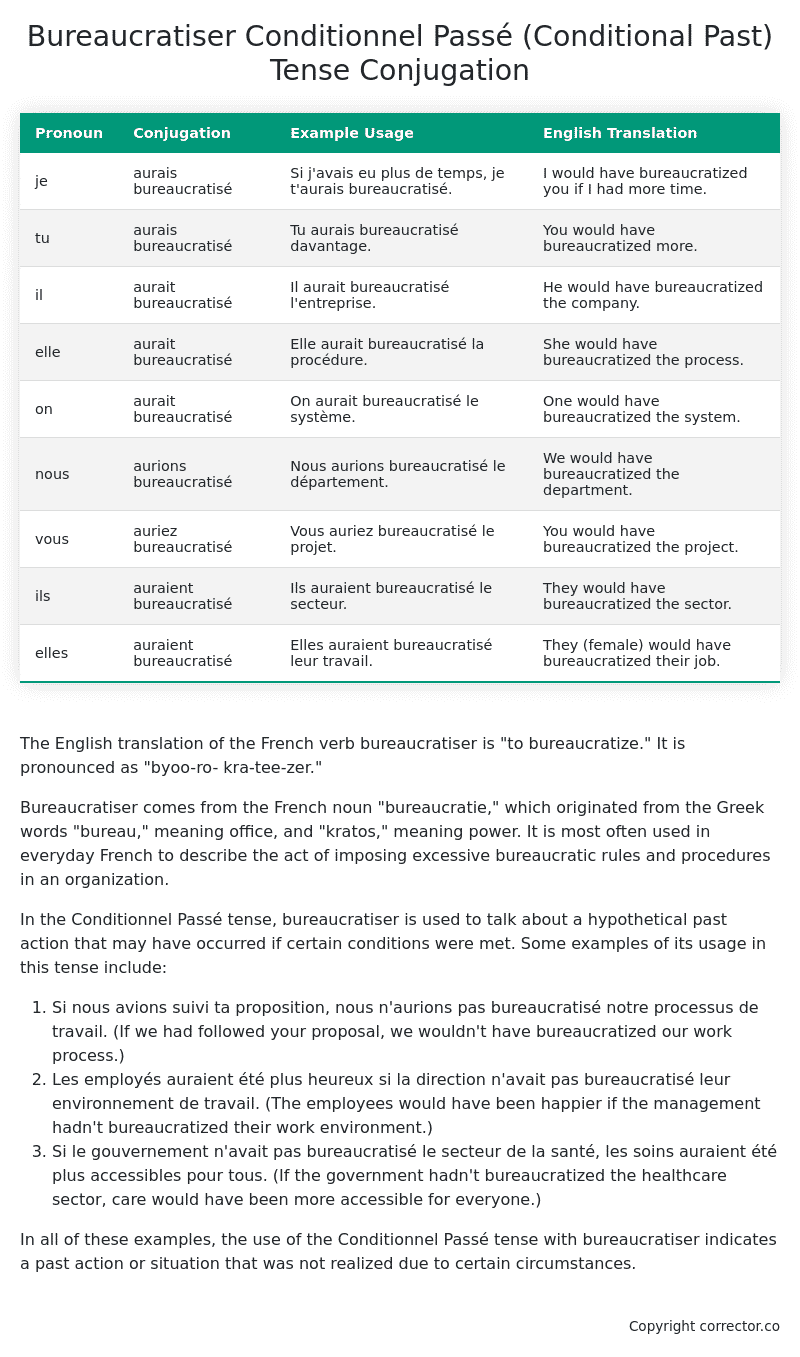Conditionnel Passé (Conditional Past) Tense Conjugation of the French Verb bureaucratiser
Introduction to the verb bureaucratiser
The English translation of the French verb bureaucratiser is “to bureaucratize.” It is pronounced as “byoo-ro- kra-tee-zer.”
Bureaucratiser comes from the French noun “bureaucratie,” which originated from the Greek words “bureau,” meaning office, and “kratos,” meaning power. It is most often used in everyday French to describe the act of imposing excessive bureaucratic rules and procedures in an organization.
In the Conditionnel Passé tense, bureaucratiser is used to talk about a hypothetical past action that may have occurred if certain conditions were met. Some examples of its usage in this tense include:
- Si nous avions suivi ta proposition, nous n’aurions pas bureaucratisé notre processus de travail. (If we had followed your proposal, we wouldn’t have bureaucratized our work process.)
- Les employés auraient été plus heureux si la direction n’avait pas bureaucratisé leur environnement de travail. (The employees would have been happier if the management hadn’t bureaucratized their work environment.)
- Si le gouvernement n’avait pas bureaucratisé le secteur de la santé, les soins auraient été plus accessibles pour tous. (If the government hadn’t bureaucratized the healthcare sector, care would have been more accessible for everyone.)
In all of these examples, the use of the Conditionnel Passé tense with bureaucratiser indicates a past action or situation that was not realized due to certain circumstances.
Table of the Conditionnel Passé (Conditional Past) Tense Conjugation of bureaucratiser
| Pronoun | Conjugation | Example Usage | English Translation |
|---|---|---|---|
| je | aurais bureaucratisé | Si j’avais eu plus de temps, je t’aurais bureaucratisé. | I would have bureaucratized you if I had more time. |
| tu | aurais bureaucratisé | Tu aurais bureaucratisé davantage. | You would have bureaucratized more. |
| il | aurait bureaucratisé | Il aurait bureaucratisé l’entreprise. | He would have bureaucratized the company. |
| elle | aurait bureaucratisé | Elle aurait bureaucratisé la procédure. | She would have bureaucratized the process. |
| on | aurait bureaucratisé | On aurait bureaucratisé le système. | One would have bureaucratized the system. |
| nous | aurions bureaucratisé | Nous aurions bureaucratisé le département. | We would have bureaucratized the department. |
| vous | auriez bureaucratisé | Vous auriez bureaucratisé le projet. | You would have bureaucratized the project. |
| ils | auraient bureaucratisé | Ils auraient bureaucratisé le secteur. | They would have bureaucratized the sector. |
| elles | auraient bureaucratisé | Elles auraient bureaucratisé leur travail. | They (female) would have bureaucratized their job. |
Other Conjugations for Bureaucratiser.
Le Present (Present Tense) Conjugation of the French Verb bureaucratiser
Imparfait (Imperfect) Tense Conjugation of the French Verb bureaucratiser
Passé Simple (Simple Past) Tense Conjugation of the French Verb bureaucratiser
Passé Composé (Present Perfect) Tense Conjugation of the French Verb bureaucratiser
Futur Simple (Simple Future) Tense Conjugation of the French Verb bureaucratiser
Futur Proche (Near Future) Tense Conjugation of the French Verb bureaucratiser
Plus-que-parfait (Pluperfect) Tense Conjugation of the French Verb bureaucratiser
Passé Antérieur (Past Anterior) Tense Conjugation of the French Verb bureaucratiser
Futur Antérieur (Future Anterior) Tense Conjugation of the French Verb bureaucratiser
Subjonctif Présent (Subjunctive Present) Tense Conjugation of the French Verb bureaucratiser
Subjonctif Passé (Subjunctive Past) Tense Conjugation of the French Verb bureaucratiser
Subjonctif Imparfait (Subjunctive Imperfect) Tense Conjugation of the French Verb bureaucratiser
Conditionnel Présent (Conditional Present) Tense Conjugation of the French Verb bureaucratiser
Conditionnel Passé (Conditional Past) Tense Conjugation of the French Verb bureaucratiser (this article)
L’impératif Présent (Imperative Present) Tense Conjugation of the French Verb bureaucratiser
L’infinitif Présent (Infinitive Present) Tense Conjugation of the French Verb bureaucratiser
Struggling with French verbs or the language in general? Why not use our free French Grammar Checker – no registration required!
Get a FREE Download Study Sheet of this Conjugation 🔥
Simply right click the image below, click “save image” and get your free reference for the bureaucratiser Conditionnel Passé tense conjugation!

Bureaucratiser – About the French Conditionnel Passé (Conditional Past) Tense
Formation
Common Everyday Usage Patterns
Expressing Unreal Past Scenarios
Polite Requests or Suggestions
Expressing Doubt or Uncertainty
Interactions with Other Tenses
Conditional Present
Indicative Past Tenses
Conditional Future
Summary
Want More?
I hope you enjoyed this article on the verb bureaucratiser. Still in a learning mood? Check out another TOTALLY random French verb conjugation!


